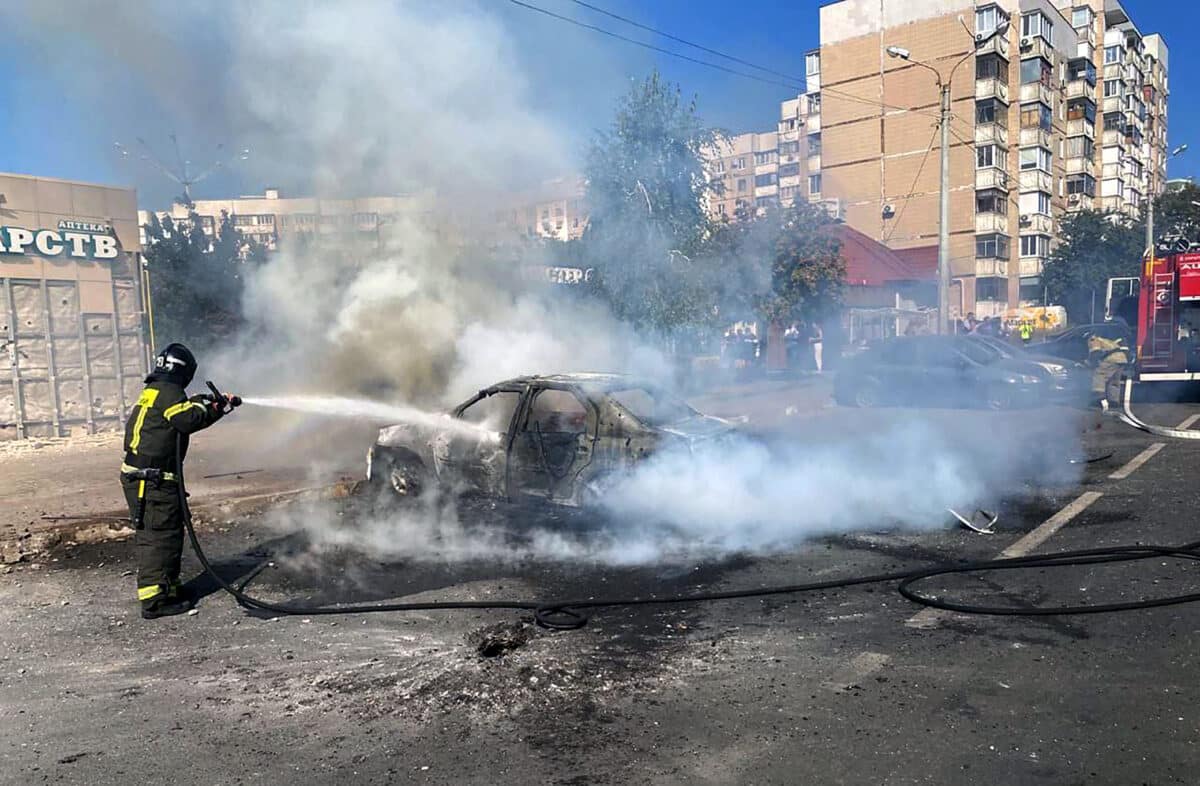Biden, Starmer meet as Russia warns over missiles for Ukraine

This undated handout photograph released on September 1, 2024, on the official Telegram account of the Belgorod region governor Vyacheslav Gladkov, shows a firefighter extinguishing a car after a recent shelling by a Ukrainian strike in Belgorod. – Russian air defense shot down 158 Ukrainian drones over 15 Russian regions overnight, including two over Moscow, the defense ministry said on September 1, 2024. The ministry said on Telegram that the largest number of drones, 122, were shot down over the regions of Kursk, Bryansk, Voronezh, and Belgorod, which border Ukraine. (Photo by Handout / TELEGRAM / @vvgladkov / AFP) /
WASHINGTON, United States — British Prime Minister Keir Starmer and US President Joe Biden are to meet Friday in Washington to discuss whether to let Ukraine fire Western-provided long-range missiles into Russia, an option that has sent tensions soaring with Moscow.
The meeting comes with Kyiv with pushing hard for permission to use the weapons, and President Volodymyr Zelensky accusing the West of being “afraid” to even help Ukraine shoot down incoming missiles as it has done with Israel.
But Russia’s President Vladimir Putin has warned that lifting the restrictions on Ukraine would mean NATO was “at war” with Moscow.
In a sign of increasing tensions, Russia revoked the credentials of six British diplomats whom it accused of spying in what London termed “baseless” allegations.
British and US media reported that a wary Biden was ready to let Ukraine deploy British Storm Shadow missiles and similar French munitions using US technology — but not US-made ATACMS missiles themselves.
The White House played down the chances of any immediate decision coming from his talks with Starmer, who’s making his second visit to the US since taking office in July.
“I wouldn’t expect any major announcement in that regard coming out of the discussions, certainly not from our side,” National Security Council spokesman John Kirby told reporters.
Kirby said there was “no change to our policy with respect to the long-range strike capability inside Russia” and added that “and I wouldn’t expect that to change today.”
Kremlin spokesman Dmitry Peskov said Putin’s message was unambiguous: “We have no doubt that this statement has reached its recipients.”
Russia’s UN ambassador Vassily Nebenzia warned separately that letting Ukraine use long-range weapons would plunge NATO into “direct war with…a nuclear power.”
‘They are afraid’
Responding to Putin’s warning, Starmer told UK media traveling with him that “Russia started this conflict. Russia illegally invaded Ukraine. Russia can end this conflict straight away.”
The talks come with Biden on his way out of office and November’s US election a toss-up between Democrat Kamala Harris and Republican Donald Trump.
Trump has repeatedly praised Putin, and refused to take sides on the war during a debate with Harris on Tuesday, saying only: “I want the war to stop.”
Starmer is set to meet Biden at the White House at 4:30 pm (2030 GMT) but has no scheduled meetings with Trump or Harris, both of whom will be on the campaign trail on Friday.
Biden said during an earlier event at the White House that Starmer had “asked if he could come and see me” but gave no further details.
In Kyiv, Zelensky said Friday that he will meet Biden “this month” to present his “victory plan” on how to end two and a half years of war with Russia.
He also said Kyiv’s recent offensive into Russia’s border region of Kursk had “slowed” Moscow’s advance in eastern Ukraine.
But he asked why the West would not do what it had done with Israel and help Kyiv shoot down the regular barrages of Russian missiles and drones it faces, saying: “They are afraid to even say ‘we are working on it.'”
‘Clear decision’
Biden said on Tuesday that he was “working” on Ukraine’s demands to use longer-range missiles, while top US and British diplomats Antony Blinken and David Lammy made a rare joint visit to Kyiv on Wednesday.
Biden has strongly supported Ukraine since Russia’s invasion, but has been risk averse about stepping up to new kinds of weapons deliveries, fearful of stoking nuclear tensions with Putin.
His reticence about allowing Ukraine to use longer-range US missiles follows similar delays on HIMARS rockets, tanks, and F-16 jets — all of which he eventually approved.
But the looming US election on November 5 means the clock is ticking on a decision.
Trump has repeatedly pledged to push through a quick deal to end the war if elected — a deal many Ukrainians fear would force them to accept Russia’s territorial gains.
German Chancellor Olaf Scholz meanwhile doubled down on Berlin’s refusal to send long-range Taurus missiles to Ukraine.
“This decision will not change,” Scholz said when asked about the issue at a press conference.